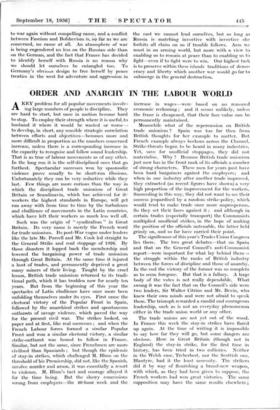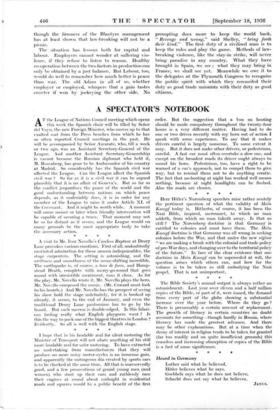ORDER AND ANARCHY IN THE LABOUR WORLD
AKEY problem for all popular movements involv- ing large numbers of people is discipline. They are hard to start, but once in motion become hard to stop. To employ their strength where it is useful, to husband it- where it would be wasted or worse— to develop, in short, any sensible strategic correlation between efforts and objectives—becomes more and more difficult in proportion as the numbers concerned increase, unless there is a corresponding increase in the capacity to recognise and follow sound leadership. That is as true of labour movements as of any other. In the long run it is the self-disciplined ones that go furthest. Spectacular successes won by spasmodic violence .prove usually to be short-run illusions. Unfortunately they can be very seductive while they last. Few things are more curious than the way in which the disciplined trade unionism of Great Britain or Scandinavia, which has achieved for its workers the highest standards in Europe, will get run away with from time to time by the turbulence and -ebullience of movements in the Latin countries, which have left their workers so much less well off.
Such was the origin of " syndicalism " in Great Britain. • Its very name is merely the French word for trade unionism. Its post-War vogue under -leaders like the late Mr. Purcell and Mr. Cook led straight to the General Strike and coal stoppage of 1926. By those disasters it lopped back the membership and lowered the bargaining power of trade unionism through Great Britain. At the same time it injured a host of trades, and permanently deprived a great many miners of their living. Taught by the cruel lesson, British trade unionism returned to its tradi- tional- path, which it has trodden now for nearly ten years. But from the beginning of this year the spectacles of Latin ebullience have once more been unfolding themselves under its eyes. First came the electoral victory of the Popular Front in Spain, followed by the anarchical strikes and spontaneous outbursts of savage violence, which paved the way for the present civil war. The strikes looked, on paper and at first, like real successes ; and when the French Labour forces formed a similar Popular Front and won a similar electoral victory, a similar strike-outburst was bound to follow in France. Similar, but not the same, since Frenchmen are more civilised than Spaniards ; but though the epidemic of stay-in strikes, which challenged M. Blum on the threshold of his Premiership, did not, like the Spanigh, involve murder and arson, it was essentially a resort to violence. M. Blum's tact and courage allayed it for the time being. But the showy concessions wrung from employers-7the 40-hour week and the increase in wages—were based on no reasoned economic reckoning ; and it seems unlikely, unless the franc is cheapened, that their face value can be permanently maintained.
Meanwhile what of the repercussion on British trade unionism ? Spain was too far then from British thoughts for her example to matter. But French example always beckons across the Channel. Strike-threats began to be heard in many industries. Yet, save for unofficial stoppages, they did not materialise. Why ? Because British trade unionism just now has in the front rank of its officials a number of strong characters. These men for years past have been hard bargainers against the employers; and when in one industry after another trade improved, they extracted (as recent figures have shown) a very high proportion of the improvement for the workers. Succeeding in this way, they did not want to see their success jeopardised by a random strike-policy, which would tend to make trade once more unprosperous. So they set their faces against it ; and although in certain trades (especially transport) the Communists multiplied unofficial strikes, in the hope of making the position of the officials untenable, the latter held grimly on, and so far have carried their point.
The significance of this year's Trades Union Congress lies there. The two great debates—that on Spain and that on the General Council's anti-Communist report—were important for what lay behind them— the struggle within the ranks of British industry between the forces of discipline and those of anarchy. In the. end the victory of the former was so complete as to seem foregone. But that is a fallacy. A large body of the votes is not really dependable. What swung it was the fact that on the Council's side were two leaders, Sir Walter Citrine and Mr. Bevin, who knew their own minds and were not afraid to speak them. The triumph rewarded a candid and courageous leadership, such as is not an everyday phenomenon either in the trade union world or any other.
The trade unions are not yet out of the wood. In France this week the stay-in strikes have flared up again. At the time of writing it is impossible to say how far they will go, but some dangers are obvious. Here in Great Britain (though not in England) the stay-in strike, for the first time in history, has been tried in two collieries. Neither in the Welsh case, Treherbert, nor the Scottish one, Blantyre, had it the least necessity. The strikers did it by way of flourishing a brand-new weapon, with which, as they had been given to suppose, the French workers had won great victories. The same supposition may have the same results elsewhere ; though the firmness of the Blantyre management has at least shown that law-breaking will not be a
picnic.
The situation has lessons both for . capital and labour: Employers cannot wonder at suffering vio- lence, if they refuse to listen to reason. Healthy co-operation between the two factors in production can only be obtained by a just balance. But Labour, too, would do well to remember how much better is peace than war. The old Adam in all of us, whether employer or employed, whispers that a gain tastes sweeter if won by jockeying the' other side. No prompting does more to keep the world back.
Revenge and wrong," said Shelley, " bring forth their. 'kind." The first duty of a civilised man is to keep the rules and play the game. Methods of law- breaking violence, like the stay-in strike, will never bring, paradise in any country. What they have brought in Spain, we see ; what they may bring in France, we shall see yet. Meanwhile we owe it to the delegates at the Plymouth Congress to recognise the public spirit with which they reconciled their duty as good trade unionists with their duty as good citizens.











































 Previous page
Previous page